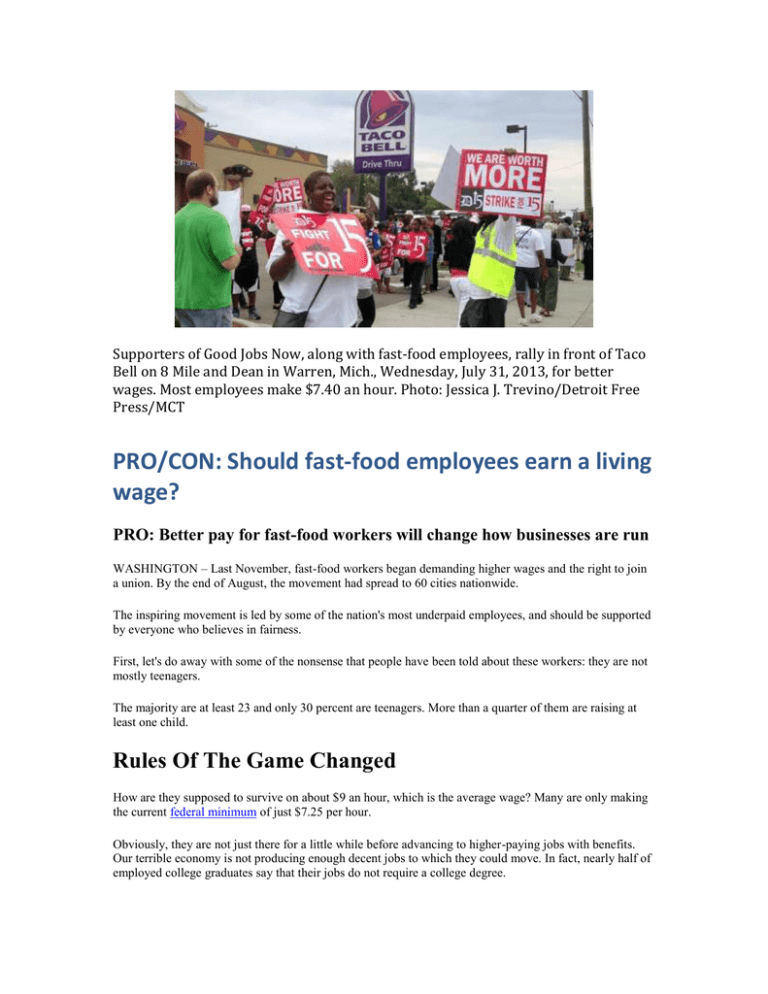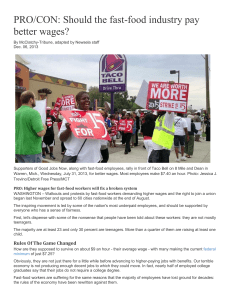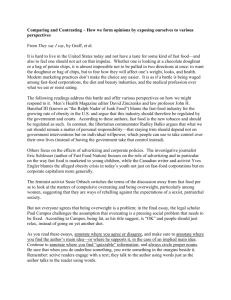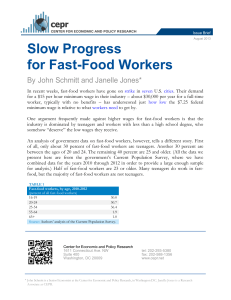File - Mrs. Stevens' Class Website
advertisement

Supporters of Good Jobs Now, along with fast-food employees, rally in front of Taco Bell on 8 Mile and Dean in Warren, Mich., Wednesday, July 31, 2013, for better wages. Most employees make $7.40 an hour. Photo: Jessica J. Trevino/Detroit Free Press/MCT PRO/CON: Should fast-food employees earn a living wage? PRO: Better pay for fast-food workers will change how businesses are run WASHINGTON – Last November, fast-food workers began demanding higher wages and the right to join a union. By the end of August, the movement had spread to 60 cities nationwide. The inspiring movement is led by some of the nation's most underpaid employees, and should be supported by everyone who believes in fairness. First, let's do away with some of the nonsense that people have been told about these workers: they are not mostly teenagers. The majority are at least 23 and only 30 percent are teenagers. More than a quarter of them are raising at least one child. Rules Of The Game Changed How are they supposed to survive on about $9 an hour, which is the average wage? Many are only making the current federal minimum of just $7.25 per hour. Obviously, they are not just there for a little while before advancing to higher-paying jobs with benefits. Our terrible economy is not producing enough decent jobs to which they could move. In fact, nearly half of employed college graduates say that their jobs do not require a college degree. Fast-food workers are suffering for the same reasons that the majority of employees have lost ground for decades: the rules of the economy have been rewritten against them. The richest 1 percent of Americans have doubled their share of America's total income from 1980 to 2011. They didn't double their slice of the pie because of changes in technology or because they had the most needed skills. They did it because the link between how much a person produces and how much he or she takes home has been broken. If the federal minimum wage had increased since 1968 the way it did in prior decades, it would be $17 per hour today. Not a meager $7.25. Repairing A Broken Link The broken link between productivity and wages is due to the fact that most workers have lost bargaining power. That is a result of intentional "reforms," including: Changes in labor law that have weakened unions; failure of the government to hold companies accountable to labor laws; International "trade" agreements that put workers –but not professionals –into serious competition with cheaper labor overseas; And many other policy changes that take money from the poor and give it to the rich. All these changes mean that American businesses depend more and more on people running up big bills on the credit cards, pouring money into the stock market, or buying big houses they can't afford. When those houses stopped selling, the Great Recession hit. The U.S. has made a weak recovery since mid-2009. Jobs are still hard to get and workers find themselves with even less bargaining power. A Call For Action The organization and united action of fast-food workers is another sign that this economic experiment of nearly 40 years has run its course. This kind of mass organizing around domestic economic issues has not been seen for a long time, perhaps since the Great Depression. President Obama supports a higher minimum-wage. Unfortunately, he didn't deliver on his campaign promise to push for the Employee Free Choice Act. The act would have gone a long way to restore workers' rights to form unions and ask for higher pay. Obama and his allies were just defeated in their efforts to drag the country into another military conflict, because Americans showed the Congress that they were sick and tired of senseless wars, and those who voted for another one would be held accountable. Maybe we should make these politicians understand that we are also sick and tired of an economy that delivers the goods to fewer and richer people each year, and leaves tens of millions of people struggling to get by. Then we might begin to reverse some of the wrongs here at home, too. ABOUT THE WRITER Mark Weisbrot is the co-director of the Center for Economic and Policy Research. This essay is available to McClatchy-Tribune News Service subscribers. McClatchy-Tribune did not subsidize the writing of this column; the opinions are those of the writer and do not necessarily represent the views of McClatchy-Tribune or Newsela. This op-ed was adapted by Newsela. CON: Better pay for fast-food workers will do more harm than good WASHINGTON – Medieval doctors treated their patients with blood-sucking leeches. Far from improving their condition, it left them worse off. Raising the wages of fast-food workers to $15 an hour would produce similar results for those the proposal is intended to help. In America, minimum-wage workers are better paid than the average worker in Mexico. Why? It's not because U.S. employers are more generous than their Mexican counterparts. Nor do Americans somehow deserve better pay. American minimum-wage earners make more because they produce more. Better education and betterfunded companies allow American workers to be more productive, raising their earnings. Competition forces businesses to pay workers according to their productivity. If companies pay less, their employees will jump ship to competitors. And if they pay workers more than they produce, they go out of business. More Pay Equals Less Jobs For better or worse, fast-food jobs are relatively low-productivity positions, typically filled by inexperienced workers. Most fast-food customers want a quick, inexpensive meal. They will not regularly pay premium prices for a burger and fries. Doubling McDonalds' wages would raise its total costs by 25 percent, meaning the company would not make any profits on its sales. But raising prices would drive customers away. If Congress forced fast-food restaurants to pay $15 an hour, they would have to get a lot more productive to justify those higher costs. That would mean replacing current workers with machines and hiring fewer, more skilled workers to maintain them. Restaurants could do this in a variety of ways, such as using iPad stations instead of cashiers to take orders, or installing the new robotic burger flipper that makes up to 400 hamburgers an hour. At current wages these costly, high-tech improvements make sense for only a few restaurants; if wages doubled they would become widespread. The end result: far fewer jobs in the fast-food industry and higher pay for those who remain. Don't Super-Size Wages Those who consider such a trade-off worthwhile miss the economic role of minimum-wage jobs. For most workers, they are entry-level positions where they can gain experience that makes them more productive and helps them command higher pay in their next job. Businesses value skills like reliability, discipline and the ability to accept instructions. Fast-food jobs instill these basic skills in inexperienced workers. Most Americans started out in a job paying within a dollar of the minimum wage. Few stay there long. The average fast-food employee stays at his or her restaurant for less than a year. These are simply gateway jobs, the first step on a career ladder. That is why the vast majority of fast-food workers are under the age of 25. Super-sizing fast-food wages would eliminate many of these entry-level positions, making it harder for young people to land that all-important first job and start climbing the ladder of success. Most lawmakers and leaders recognize this. Not even the most liberal state has a minimum wage anywhere near $15 an hour. An Economy Torched By Higher Pay American Samoa is an example of would happen if the supporters of the "living wage" movement prevail. The island territory used to have a separate minimum wage because of its lower incomes. However, in 2007 Congress applied the U.S. minimum wage to Samoa. For the tiny Pacific Ocean nation this was the economic equivalent of $20 an hour. It did not boost purchasing power, increase the demand for goods and services or improve the way people live. Instead, unemployment septupled to more than 35 percent. The Samoan economy collapsed. The islands' governor begged Congress to suspend the wage hikes, pleading: "Our job market is being torched. Our businesses are being depressed. Our hope for growth has been driven away. How much does our government expect us to suffer?" Economics are not like laws that can be repealed, no matter how good intentions are. Requiring dramatically higher fast-food wages would eliminate hundreds of thousands of entry-level jobs. This would no more help fast-food workers than bleeding them with leeches.


